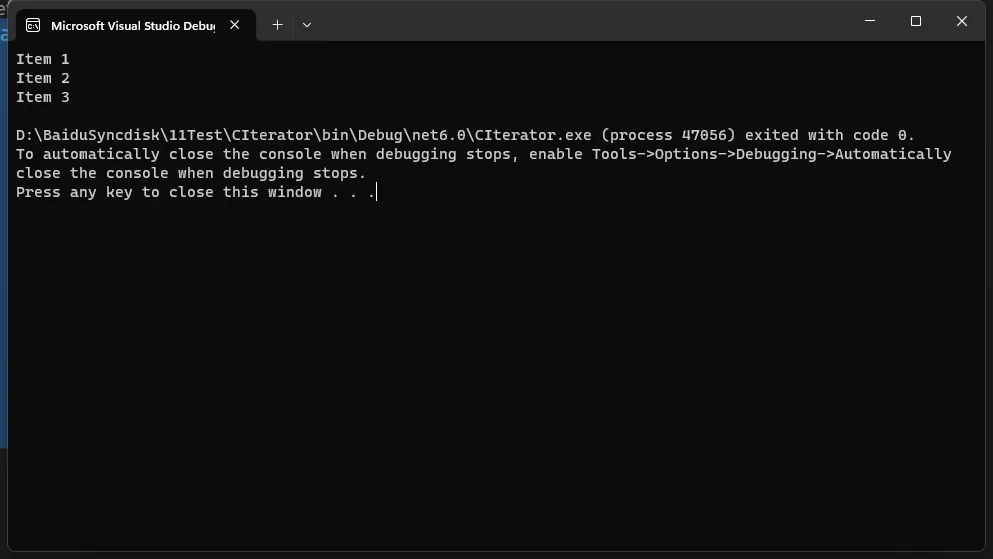目录
摘要
迭代器模式是一种行为型设计模式,它提供了一种访问和遍历容器对象中各个元素的方法,而不需要暴露容器的内部结构。通过使用迭代器模式,可以将遍历算法与容器对象分离,使得容器对象的结构和遍历行为可以独立地变化。
正文
迭代器模式的结构
迭代器模式包含以下几个角色:
- 迭代器(Iterator):定义访问和遍历元素的接口。
- 具体迭代器(Concrete Iterator):实现迭代器接口,负责实现具体的遍历算法。
- 容器(Container):定义获取迭代器的方法。
- 具体容器(Concrete Container):实现容器接口,负责创建具体迭代器对象。
迭代器模式的应用场景
迭代器模式适用于以下情况:
- 当需要遍历一个容器对象的元素时,可以使用迭代器模式。
- 当需要对容器对象的遍历算法进行封装时,可以使用迭代器模式。
- 当需要提供多种遍历方式时,可以使用迭代器模式。
以下是一些可能的应用场景:
集合类遍历
在一个集合类中,可以使用迭代器模式来遍历集合中的元素。例如,可以使用迭代器模式来遍历一个数组、列表或字典中的元素。
文件系统遍历
在一个文件系统中,可以使用迭代器模式来遍历文件和文件夹。例如,可以使用迭代器模式来遍历一个文件夹中的所有文件和子文件夹。
数据库查询结果遍历
在一个数据库查询中,可以使用迭代器模式来遍历查询结果。例如,可以使用迭代器模式来遍历一个查询结果集中的所有记录。
例子
我们需要定义一个迭代器接口IIterator,其中包含访问和遍历元素的方法:
C#public interface IIterator
{
bool HasNext();
object Next();
}
我们有一个名为Aggregate的容器接口,其中包含获取迭代器的方法GetIterator():
C#public interface IAggregate
{
IIterator GetIterator();
}
我们可以创建一个具体容器类ConcreteAggregate,实现IAggregate接口,并在GetIterator()方法中返回一个具体迭代器对象:
C#public class ConcreteAggregate : IAggregate
{
private List<object> _items = new List<object>();
public void AddItem(object item)
{
_items.Add(item);
}
public IIterator GetIterator()
{
return new ConcreteIterator(this);
}
public int Count
{
get { return _items.Count; }
}
public object this[int index]
{
get { return _items[index]; }
set { _items[index] = value; }
}
}
然后,我们可以创建一个具体迭代器类ConcreteIterator,实现IIterator接口,并在HasNext()和Next()方法中实现具体的遍历逻辑:
C#public class ConcreteIterator : IIterator
{
private ConcreteAggregate _aggregate;
private int _index;
public ConcreteIterator(ConcreteAggregate aggregate)
{
_aggregate = aggregate;
_index = 0;
}
public bool HasNext()
{
return _index < _aggregate.Count;
}
public object Next()
{
object item = _aggregate[_index];
_index++;
return item;
}
现在,我们可以在客户端代码中使用迭代器模式来遍历容器中的元素:
C#static void Main(string[] args)
{
var aggregate = new ConcreteAggregate();
aggregate.AddItem("Item 1");
aggregate.AddItem("Item 2");
aggregate.AddItem("Item 3");
var iterator = aggregate.GetIterator();
while (iterator.HasNext())
{
object item = iterator.Next();
Console.WriteLine(item);
}
}

总结
迭代器模式是一种将遍历算法与容器对象分离的设计模式,它提供了一种访问和遍历容器对象中各个元素的方法。通过使用迭代器模式,可以实现更灵活、可扩展和可维护的代码。
本文作者:技术老小子
本文链接:
版权声明:本博客所有文章除特别声明外,均采用 BY-NC-SA 许可协议。转载请注明出处!
目录